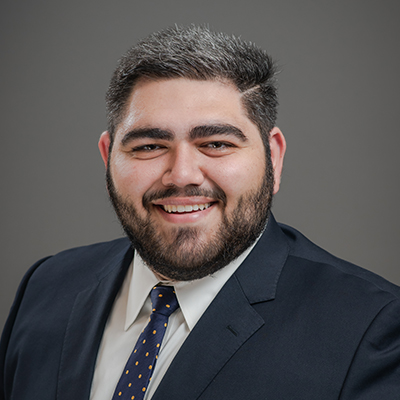Major: Political Science and Philosophy emphasis on law and public policy
Minor: Legal Studies
What is your current position/career?
I am currently a second-year law student at the Duke University School of Law. This summer I will be a Summer Associate at Gibson, Dunn, and Crutcher in Los Angeles doing litigation work.
What were some of your favorite aspects of your major program? Such as research, classes, professors, etc.
The philosophy department, being so small, was an incredibly tight-knit community. I knew all my fellow majors, developed meaningful relationships with my professors, and got to participate in planning cool events like the annual Harold Stoner Clark lectures. I also felt very supported by professors in advancing my academic work in various symposia; in fact, I was accepted to an undergraduate philosophy symposium during my junior year but it was canceled due to COVID.
The political science department offered so many interesting courses that allowed me to investigate government, policy, and advocacy in varying different topic areas. For example, I took courses on politics and the internet, global development, and political thought such that I felt that I was well-versed in modern issues as they relate to political science. I also really enjoyed the opportunities that were opened up to me as a political science student. Through the department I was able to participate in the Lutheran College Washington Semester in D.C. and the Oxford program (virtually) as well as work in various internships with the United States Attorney’s Office, the Los Angeles County Public Defender, and the Senate Committee on Health, Education, Labor & Pensions.
What key skills did you learn in the program that you now use in your current position/career?
Critical thinking and writing are vital in law school, and I owe it to my professors for guiding me in sharpening these skills. As a result of those lessons, I am now a research editor in the Duke Law Journal, Duke’s flagship law review.
Studying philosophy not only laid the foundation for my critical thinking skills, but has also allowed me to think about the law in a broader way. I am not only able to think about what the law is and how it is applied, but I can investigate what the law ought to be and how lawyers should act to make the law more ideal. More specifically, in writing my law school Note—which is similar to a capstone or thesis project—I was able to identify a specific issue in the law that could only be resolved by thinking about how we ought to protect individuals. Even more practically, studying philosophy was extremely useful in preparing for the LSAT and succeeding in rule-based reasoning that is inherent in legal practice. Similarly, the type of writing practiced in a philosophy major—where you evaluate, critique, and advance arguments—prepared me for the writing style of a lawyer and a law school exam.
All the professors in the political science department helped me identify my passions and pursue my goals and encouraged me to do things that I never thought I could. More than that, they each helped sharpen my research, writing, and analytical skills which have been vital in all my previous work and now in law school. Moreover, having to think about law and public policy as an undergrad, I felt even more prepared to engage in statutory interpretation and evaluating statutes and policy arguments because I had seen legislation before. Additionally, having a policy background is helpful in advancing arguments in legal briefs that would otherwise go unconsidered. Similarly, this background also helped me with my aforementioned Note because I recommended a statutory provision to remedy the issue I was trying to solve, which would have been impossible to do if I did not know what a statute of this sort looks like. Even more helpful was that Dr. Haco Hoang, PhD, even after I graduated, was willing to help me navigate this proposal and create a unique resolution to the problem I identified. I also think my political science professors were extremely helpful in teaching me how to network and build meaningful connections with others. That has been vital in getting me various internships and jobs and I could not be more grateful for learning that skill at Cal Lutheran.
How has your major’s program set you up for success?
All my professors were instrumental in helping me get into law school. Many of them wrote letters of recommendation, served as references, and reviewed my materials to help make my dreams come true. I don’t think other universities can offer the same to their students—given the size or teaching style of other colleges—so I am extremely grateful for all the support and opportunities Cal Lutheran gave me.
